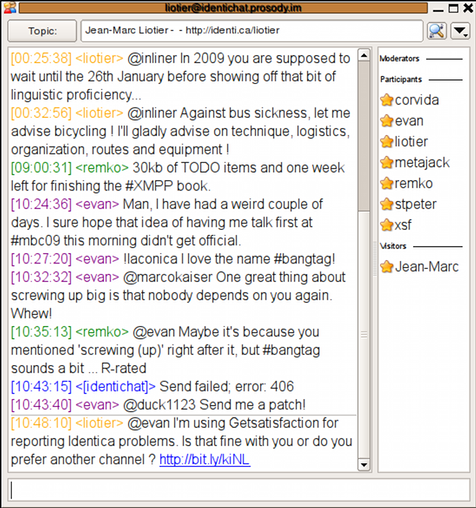Open is everything – the rest is details. That is why we must take the best use cases of the closed social networking world and port them in the open. This is a lofty goal in all meaning of the adjective, but a surprisingly large number of potential basic components are available to cut the way short.
Friend of a Friend (FOAF) enables the creation of a machine-readable ontology describing persons, their activities and their relations to other people and objects. This concept is a child of the semantic web school of thought that has its origins about as far ago as the Web itself. In a narrower but deeper way, XFN (XHTML Friends Network) enables web authors to indicate their relationships to people simply by adding
Microformats such as hCard, xfn, rel-tag, hCalendar, hReview, xFolk, hResume, hListing, citation, media-info and others provide a foundation for normalizing the information sharing. Some major operators are starting to get it – for example my LinkedIn profile contains hCard and hResume data. If you like hresume, take a look at DOAC while you are at it !
Some code is already available to process that available information. For example, identity-matcher is a Rails plugin to match identities and import social network graphs across any site supporting the appropriate Microformats. This code extracted from the codebase of dopplr.com and this is probably how Dopplr now supports import from other social networks like Twitter.
But part of the appeal of a social networking platform is how it empowers the user with control of what information he makes available, how it makes it available and to whom. So microformats are not sufficient : a permission management and access control system is necessary, and that requires an authentication mechanism. That naturally takes us to OpenID.
OpenID is a decentralized single sign-on system. Using OpenID-enabled sites, web users do not need to remember traditional authentication tokens such as username and password. Instead, they only need to be previously registered on a website with an “identity provider”. OpenID solves the authentication problem without relying on any centralized website to confirm digital identity.
The OpenID project is going even further than just authentication – authentication is just the surface. What OpenID really is about is digital identity management. OpenID Attribute Exchange is an OpenID service extension for exchanging identity information between endpoints. Although the list of attributes included in the OpenID Attribute Exchange schema does not match a nice collection of microformats, a process is defined to submit new attributes. And anyway, such a standard looks like a great fit to cover the need for keeping the user in control of his own content.
Finally, the social graph is the support for applications that must interact with the user’s information wherever it is hosted. That is why Google’s OpenSocial specification proposes a common set of API for social applications across multiple websites.
So a few technologies for social networking do exist, and they seem able to provide building blocks for an open distributed social networking. The concept of open distributed social networking itself has been in people’s mind for a long time. But until now only large proprietary platforms have succeeded in seducing a critical mass of users. Thanks to them, there is now a large body of information about the best practices and use-cases. What is now necessary is to think about how those use-cases can be ported into a decentralized open environment.
Porting a closed single provider system into an open distributed environment while equaling or surpassing the quality of the user experience is a huge challenge. But social networking and digital identity management are such critical activities in people’s life that the momentum behind opening them may soon be as large as the one that led Internet pioneers to break down the walls between networks.
